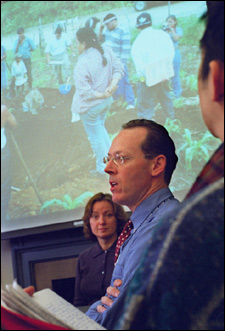Scholars, activists call for justice
Radcliffe, HMS activists Harbury, Farmer discuss human rights abuses in Guatemala and Haiti
The ivory tower has a tenuous hold on Radcliffe Fellow Jennifer Harbury and Harvard Medical School Professor of Medical Anthropology Paul Farmer, who have traded lofty academic seclusion for messy, complicated, and dangerous work in the jungles and judicial systems of Guatemala and Haiti. At the David Rockefeller Center for Latin American Studies (DRCLAS) Tuesday (Feb. 17), they

bore witness to human rights abuses that grip those two nations in a lecture called “Impunity in Latin America: Human Rights Abuses and Reconciliation in Guatemala.” James Cavallaro, associate director of the Human Rights Program at Harvard Law School, led a discussion after their remarks.
Harbury is a Harvard Law School graduate best known for her campaign to save the life of her late husband, Mayan resistance leader Efrain Bamaca Velasquez, when he was “disappeared” by the Guatemalan military in 1992. She argued that Nuremberg-style trials are necessary to end human rights abuses in Guatemala and to help the Central American nation move forward. Farmer, whose Partners in Health organization supports health care clinics for the poor in Latin America, Russia, Boston, and Haiti, amplified Harbury’s case with a close look at the nature of impunity.
“Impunity, obviously, is about power. It’s the power to commit crimes and then have them ignored,” he said. “But mostly, it’s about having them ignored. It’s about not needing to cover up your own crimes.”
Both Harbury and Farmer described horrific human rights abuses they’d witnessed, detailing the transnational roots of the crimes and the role of the U.S. government in them.
Harbury spoke about several of the hundreds of thousands of cases of human rights abuses in Guatemala during that nation’s 35-year war that ended in the mid-1990s. With the government under de facto control of the military, she said, 200,000 people – mostly the indigenous Mayans who comprise 80 percent of the nation’s population – were illegally killed or disappeared. She detailed massive slaughters of citizens – the burning of the Spanish embassy in 1980 that killed 39 protesters and embassy workers; the shootings, rapes, disembowelings, and bombing that killed all but one citizen of a village – and several individual cases.
With professional composure (and a later admission of her struggle to maintain it), Harbury told the audience how her husband, who ranked high in the Mayan resistance, was captured in 1992 and subjected to severe, long-term torture. She was told he had died, but she later learned he was likely held and tortured for at least two years before being killed either by being disemboweled or thrown out of a helicopter. Her own campaign to save him and learn about his capture resulted in three dangerous hunger strikes as well as disclosures about the close relationship between the CIA and Central American death squads.
Mayan civil rights leaders and other humanists – including Harbury – are still threatened with violence. “Today in Guatemala, the human rights situation continues to be disastrous. Anybody trying to carry out basic reforms in Guatemala continues to fear for their own lives, the lives of their families and their children,” said Harbury. The military and political forces that perpetuate these human rights abuses should face international trials like the post-World War II Nuremberg trials, she said.
“Guatemala can’t go anywhere until there’s Nuremberg trials. We’re locked in a massacre system,” she said.
Drawing from his extensive work in Haiti, as well as projects in Guatemala, Farmer echoed Harbury’s call that the perpetrators of human rights abuses be brought to justice internationally. The nature of impunity in places like Haiti and Guatemala impedes justice, said Farmer, adding that the crimes and human rights abuses are often conducted very openly. He described Haitian military officials admitting their role in human rights crimes on national television. “That’s the way impunity works. It’s signed in blood and made public,” he said.




